Waking up in the morning to a giant scratch on your little one’s face is probably every new parent’s nightmare.
Many parents blame themselves until they notice their baby scratching his face during the day as well and realize there might be something wrong with the baby’s skin.
There are various reasons why a baby scratches his face, but most of them are perfectly normal and harmless.
However, if you’re not sure why your baby is scratching his face, read until the end and find out everything you need to know about this occurrence!
Baby Scratching Face – Why Does This Happen?
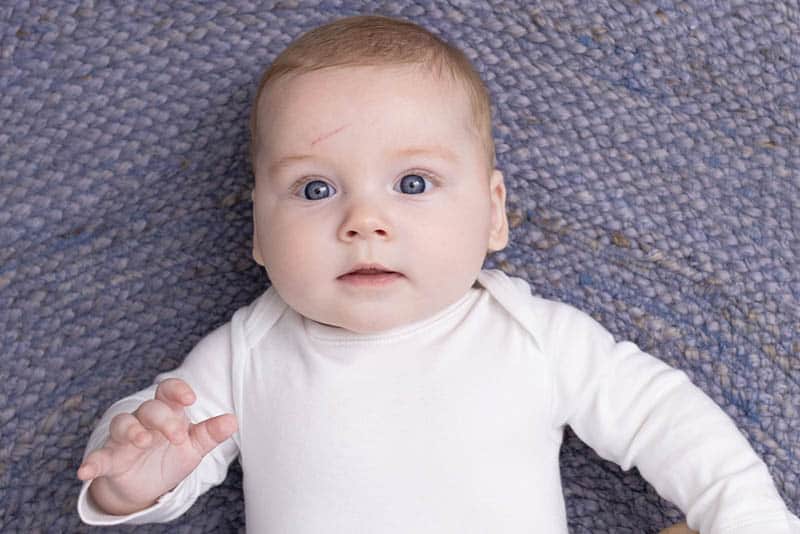
A baby’s skin is very sensitive and prone to different skin conditions that might cause irritation, redness, or itchy skin.
There’s usually no reason to worry, but still, many parents feel anxious seeing scratch marks on their baby’s face.
There are several reasons why a baby keeps scratching face, most of them being completely harmless.
However, that doesn’t mean no action should be taken to prevent future baby scratches.
It’s important to discover the cause to understand how to treat the issue properly.
Here are some of the most common reasons why your little one scratches his face.
1. Various skin conditions
Unfortunately, newborns and babies often encounter all sorts of rashes, redness, dry skin, and other unpleasant skin conditions that cause itchiness or pain.
A baby’s skin is very delicate and can be irritated by essentially anything surrounding him, from clothes to food allergies (the baby usually has an allergic reaction to food eaten by the breastfeeding mama).
Atopic dermatitis
Atopic dermatitis is one of the most common skin conditions that appears somewhere between 3-6 months of age.
This condition causes dry skin that becomes red and itches a lot. It usually appears in moist areas, where the skin flexes most, such as the inside of knees and elbows, or the frontal part of the neck.
The cause of this condition has not yet been discovered, but there are some assumptions that it may be caused by a low immune system, genes, or external factors such as warmer baths, high temperatures, or winter weather.
Eczema
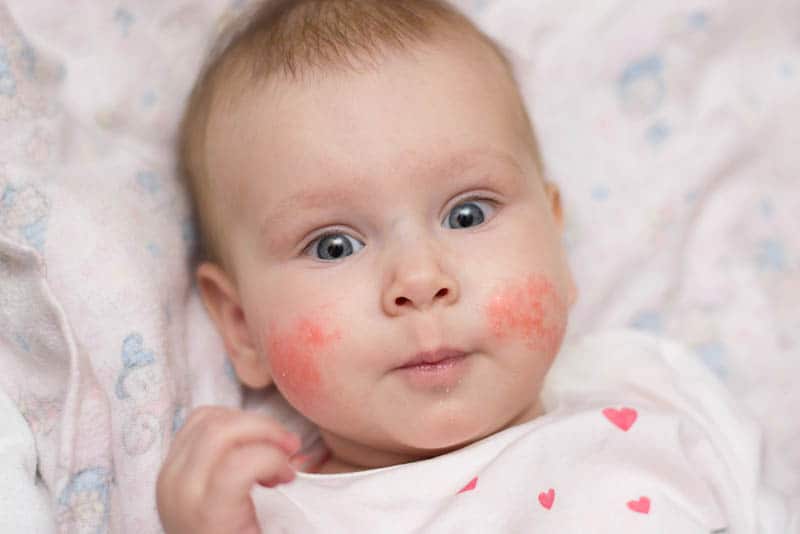
Eczema flare-ups usually cause flaky, red patches on the baby’s skin which can be very irritating and itchy.
Parents often mistake it for an itchy rash and treat it with inadequate baby products and remedies.
If you’re not sure whether your little one has baby eczema or some other type of rash, you should ask your pediatrician for professional advice.
It can show on any part of the body, although it usually appears on joints or cheeks.
The skin becomes very dry, rough, and flaky. It may be aggravated if the baby scratches it intensively, but fortunately enough, most children outgrow it before school.
Eczema usually appears because of genes, germs, or the low production of ceramides (fatty cells).
If the body doesn’t contain enough ceramides, the skin loses too much water and leaves dry skin.
Scabies
Scabies is a skin infection caused by Sarcoptes scabiei (mites) which reproduce and lay eggs on the skin.
This causes an itchy rash with fluid-filled dots that can cause strong irritation.
The scabies mite is usually transferred to the baby by direct contact with someone who is infected or through fabric (clothes or bedding).
Animals are common transmitters as well.
If a parent notices bumpy, red dots positioned in clusters near elbows, knees, between toes and fingers, underarms, or other areas which flex, it would be best to seek professional medical advice.
Heat rash
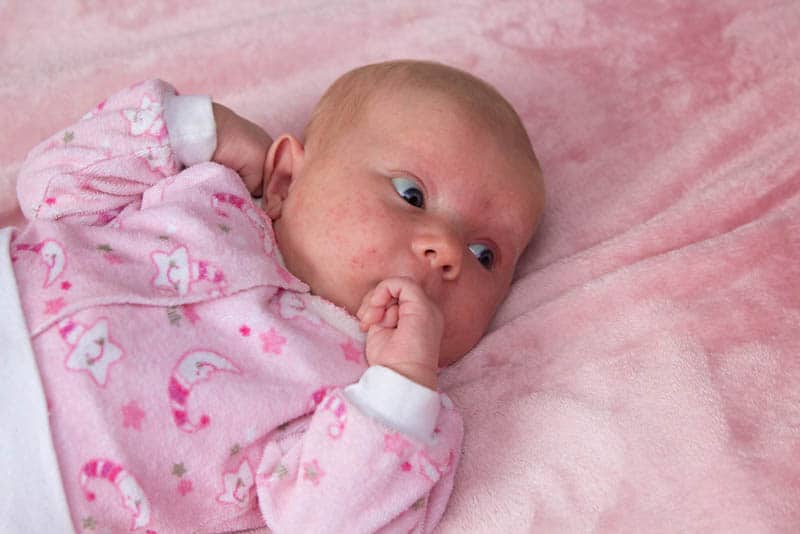
Another common condition is the non-contagious heat rash that’s not dangerous itself, but it does warn parents that it’s too hot or humid, especially those who cover their baby in extra layers of clothing.
Also referred to as miliaria, it appears during hot and humid weather.
Most babies can’t sweat the same way as adults. Therefore, when the sweat glands become blocked, the rash appears.
It usually happens when parents overdress their children or when the fabric doesn’t allow any ventilation.
Using too many blankets during sleep or thick gels and creams may cause a heat rash as well.
RELATED: The Best Guide On How To Dress Baby For Sleep
2. Baby is exploring his face
This is probably one of the most common reasons why the baby scratches his face all the time.
This action is completely natural and expected and it’s actually a sign of healthy development in a baby.
Soon he’ll start discovering his whole body, so he won’t be so obsessed with his face.
I know, it’s not pleasant to walk around with a baby who looks like he had a rough time at the bar last night, but sometimes you just have to roll with the punches.
If you don’t see any signs of redness or itchiness (if your baby doesn’t scratch his face repeatedly), there’s no need to worry at all!
3. Startle (Moro) reflex
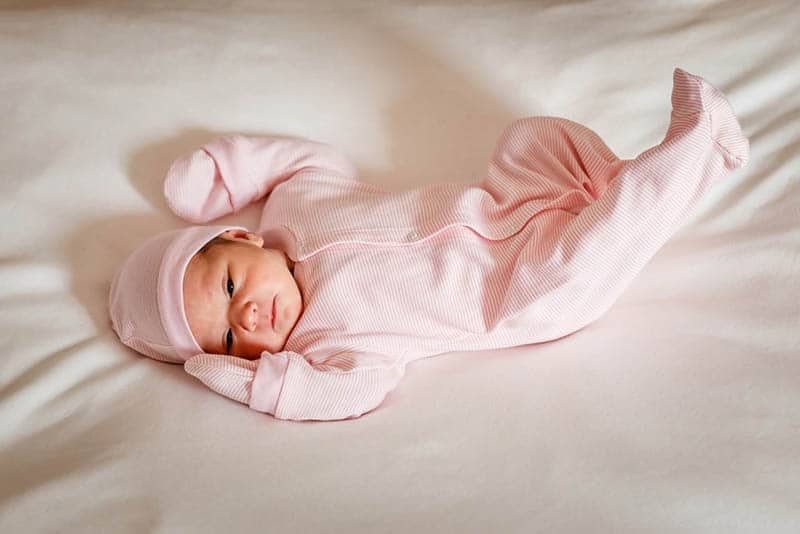
Your baby scratching his face may not be a voluntary action.
The startle reflex is an involuntary motoric reaction most infants have after birth.
It usually lasts for the first few months and should go away by the time the baby is six months old.
Essentially, the baby reacts to any sudden noises or movements by arching his back or throwing his legs or arms up or to the sides.
Babies often scratch their faces this way, especially if they have sharp nails.
4. Sharp little nails
Baby nails should be cut often, at least once or twice in a week, or when you see they’ve grown enough for him to scratch himself.
One of the funniest superstitions I’ve ever heard is that you shouldn’t cut your baby’s nails because it may bring bad luck to parents and the baby!
However, if you don’t cut them, your baby might get a skin infection caused by the scratch on his face (which is very real).
Even though a newborn baby’s nails are thin, they can be very sharp and leave deep enough marks that might become infected with dirt or germs and cause serious skin conditions.
Baby clippers are one of the essential baby items to buy before birth and you should always have them close by!
5. Dry skin
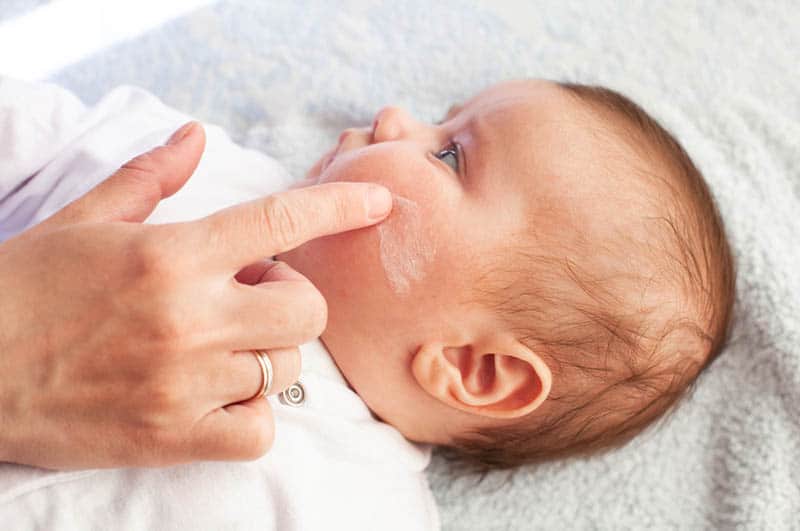
Dry skin isn’t only caused by skin conditions. Actually, baby skin is quite susceptible to loss of water and moisture.
Dry skin can be caused by various things, but it’s most typically influenced by external factors such as:
• Harsh shampoos
• Hot or cold weather
• Low humidity
• Baby powder
All these things might get your baby’s skin itchy and dry. It might even cause further irritation including flaky spots.
6. Feeling upset
A baby may scratch his face if he cries a lot or is upset about something.
Babies can’t control their hand movements at an early age, so it’s no surprise most little ones accidentally leave scratch marks on their faces.
We all feel really bad when it happens, but sometimes you just can’t prevent it.
How Can I Stop My Baby Scratching Face?
There are many ways to prevent a baby from scratching his face, depending on the reasons for the action.
Swaddling
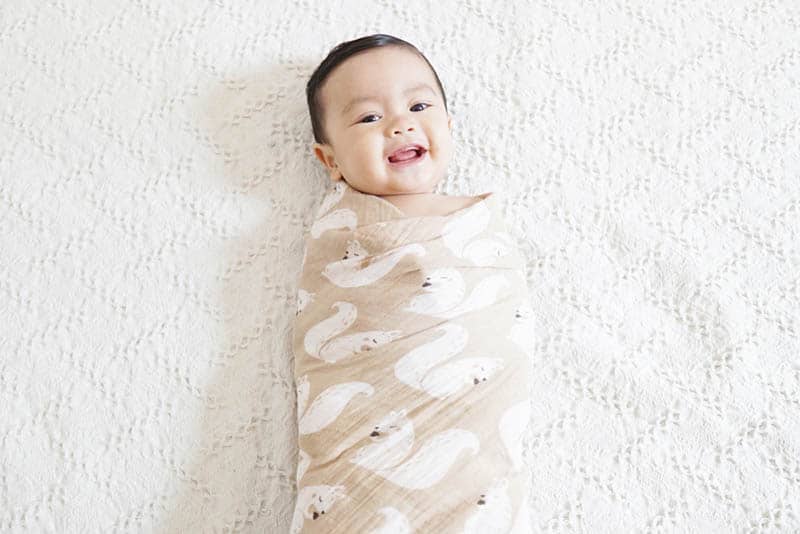
One of the best ways to prevent any scratching marks or scars is swaddling.
The baby’s hands are wrapped in a cover preventing any possibility of scratching himself.
Swaddles are especially useful when the baby sleeps because it prevents any uncontrolled movements of arms or legs.
If you don’t have time for shopping, you can get some of the cutest high-quality swaddles on shopping sites such as Amazon or Etsy!
Some parents use mittens to cover their little one’s hands and prevent any unwanted scratches, especially if the baby breaks out of the swaddle.
However, others believe there is no need for mittens if a baby’s nails are regularly trimmed.
Trimming the nails
Even though nail trimming might cause anxiety for some parents (we’ve all been there), don’t worry; if you go slowly and use baby clippers, there will be no problems!
The American Academy of Pediatrics suggests cutting the nails after a bath or when the baby falls asleep.
If you don’t feel comfortable with clippers, you may use baby nail scissors as well. You’ll find them in every infant grooming kit.
The most important part of this process is to choose the item you feel most comfortable working with.
That way, you and the baby will feel safer, without any accidental cuts.
Use moisturizers
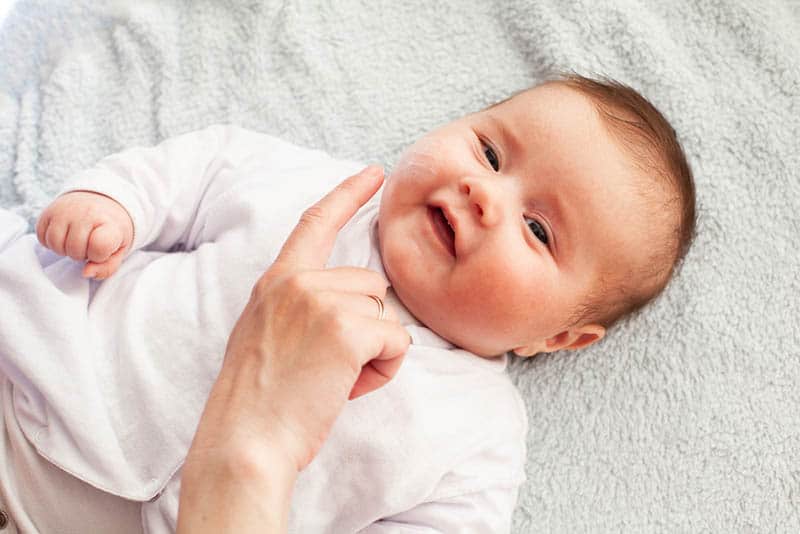
We tend to only use moisturizers when we hit our adult years and realize that our skin isn’t going to stay that soft forever.
But babies need moisturizers too!
Plenty of babies have very sensitive skin and require special skincare, including moisturizers and antiseptic creams.
Instead of ignoring the dry skin issue, get a baby moisturizing lotion and apply it regularly to your baby in order to avoid any further complications.
However, some products might just be over-the-counter ways to treat dryness and aren’t suitable for all skin types.
Therefore, the best option is to visit a doctor and get professional advice about the type of skin condition your baby has and the proper treatment.
Don’t expose baby to loud noises and flashing lights
Last but not least, parents should avoid baby exposure to flashing lights or loud noises.
This is not only recommended for the prevention of face scratching, but for the healthy development of the baby.
If the baby is overly exposed to such stimuli, it might become overwhelming for him and may cause more serious health issues.
Wrapping Up
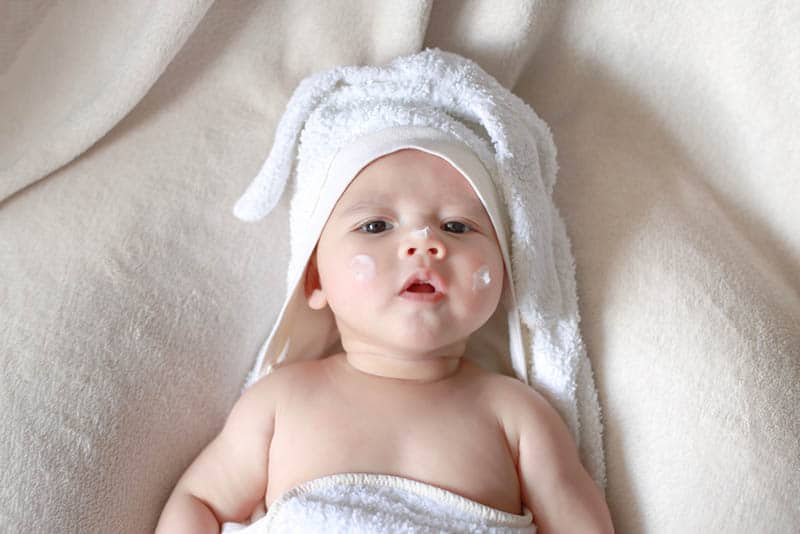
Many new parents consider the first year of a baby’s life to be the most difficult and overwhelming part of their lives.
Each milestone is marked by sleepless nights and endless walks through every room and corner of the house.
Every little occurrence causes a mini heart attack for parents, and seeing a long scratch on your newborn’s face doesn’t help at all!
Although it doesn’t look nice, a few scratches aren’t a big deal, but they might be the warning sign for a variety of serious skin conditions that might have long-term negative effects.
If you’re struggling with your baby scratching his face, I hope you found all the answers you needed to keep those little fingers away so they don’t cause any more problems!
References:
• American Academy Of Pediatrics. (2009, October 13). “Caring for Your Baby and Young Child: Birth to Age 5”.
Like this post? Please share or pin it for later. You can also stay in the loop and follow us on Facebook, Instagram or Pinterest.
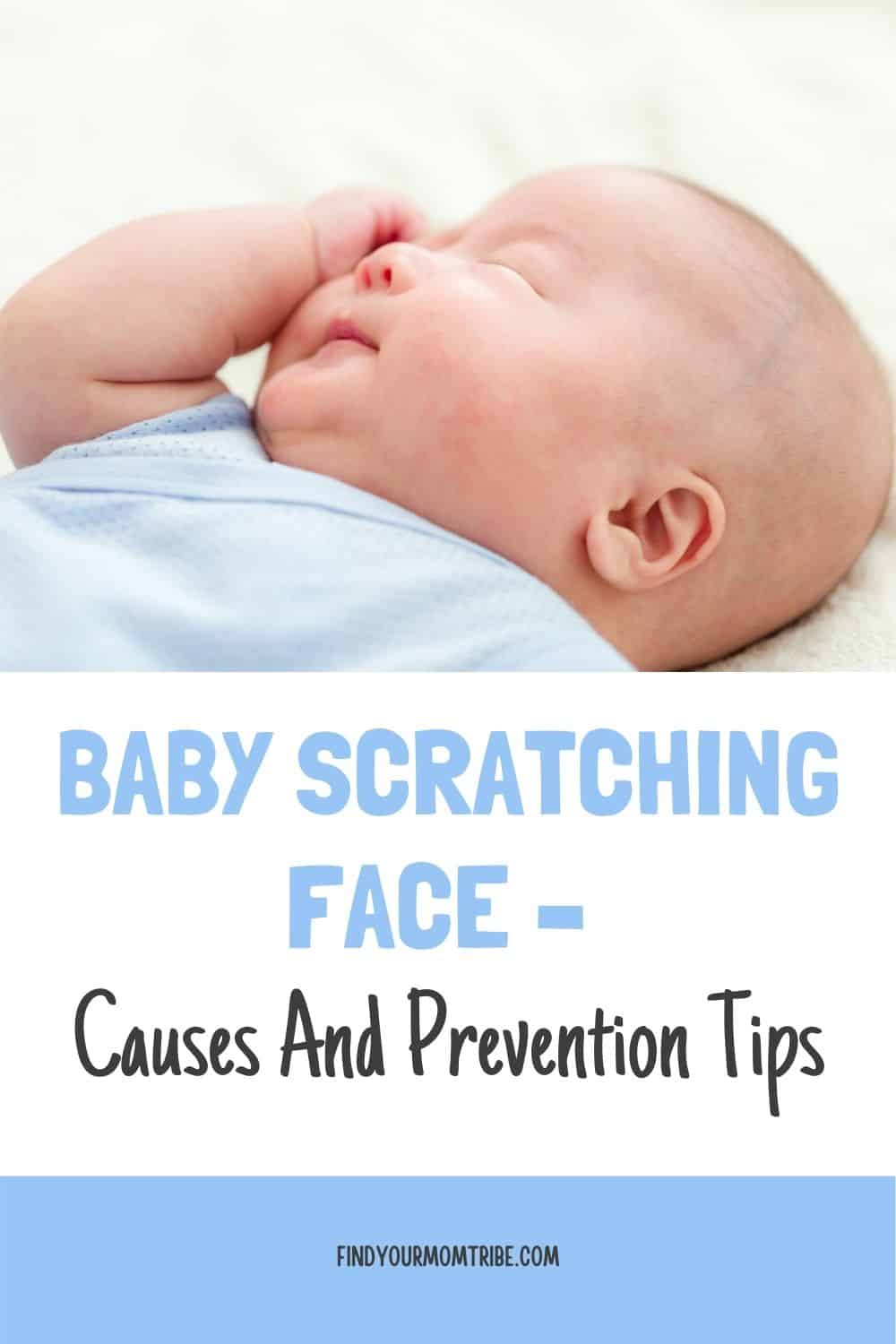
We love honesty! Find Your Mom Tribe is an Amazon Associate and we earn from qualifying purchases through affiliate links at no extra cost to you. Please see our full Amazon Affiliate disclosure for more information.

